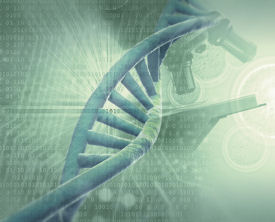Court case questions patentability of human genomic structure
The human genome is not only known, but owned, to a certain extent. The effect is a chill on medical research, impaired diagnostic testing and companies unwilling to risk research ##amp; development funds for projects with no payoff.
Though patent law is not always a topic that instills much passion, media outlets have recently covered a court ruling on DNA patenting that has the genomics world in a twist. My personal favorite was a recent article titled “What DNA, patents and [pop singer] Lady Gaga have in common.” Superficially, it may seem absurd that a human gene should be patentable, any more than a toenail or an eyelash is patentable. However, the U.S. Patent and Trademark Office (USPTO) has held that genes are patentable for some time.
In fact, many may be surprised to learn that an estimated 20% of human genes are already patented (though rest assured your genes are your own as long as the sequence stays in your body). The potential reach of gene patents is substantial. In some cases an infringement can be claimed when the gene sequence is determined outside of an individual's body for reasons not covered by the patent, even in the setting of research studies.

On March 29, 2010, in a case (Association for Molecular Pathology et al. v. USPTO et al.) involving Myriad Genetics and the American Civil Liberties Union (ACLU), U.S. District Court Judge Robert Sweet invalidated long-held patent claims of Myriad Genetics and the University of Utah regarding the BRCA1 and BRCA2 genes. Mutations in these genes are associated with greatly increased risk for breast, ovarian and other cancer in the approximately 1 in 500 individuals who are affected. The invalidation of these claims could signal the end of Myriad's monopoly on a potentially life-saving genetic test that currently costs several thousand dollars.
The basis for gene patents rests in part on establishing the novelty, non-obviousness and usefulness of the subject of the patent. Additionally, a patent cannot be obtained for a natural product. Something like copper or an animal species cannot be patented. Yet the convoluted, but internally coherent, logic underlying human gene patents rests largely on the methodology used to discover the gene sequence and not on the information content of the sequence.
The ACLU's case directly challenges this logic, and argues that the content of the gene sequence is what matters, not the method by which it is derived, and further, that the information content itself is naturally occurring and not patentable. If the recent ruling, which agrees with the ACLU arguments, is upheld, this case would set a precedent for other challenges to existing gene patents with potentially great consequences for the biotechnology industry. Myriad has stated that it is planning to appeal the ruling, and the case may eventually reach the Supreme Court.
The answer to whether gene patents are “good” or “bad” is not a simple one. Patents are intended to provide financial incentives for the research and development work necessary to bring a new product (like a genetic test) to market by granting a temporary monopoly to the patent holder in exchange for public disclosure. In fact, patents are an extremely important part of the foundation of our economy, and are provided for in Article 1 of the U.S. Constitution. Clearly, an entity that is capable of investing millions of dollars to perform ground-breaking research to bring a new DNA diagnostic test to market would be more likely to do so if it had a defined period of protection from copycat competitors. This type of investment by industry is critical to bringing research advances to patients.
Conversely, is it appropriate to allow an entity to charge “what the market will bear” for a test and prevent new test development in the setting of a sanctioned monopoly, especially if some of the research was supported by public funds? Additionally, National Human Genome Research Institute-funded research by investigators at the Duke University Center for Genome Ethics, Law and Policy that was published online in an April supplement to Genetics in Medicine suggests that exclusive licensing of patents may be more important to the downstream availability of DNA-based diagnostics than the patent itself.
Recently, the U.S. Department of Health and Human Services Secretary's Advisory Committee on Genetics, Health, and Society issued a controversial report suggesting reforms to DNA patenting and licensing in the U.S., available online.
Unsurprisingly, the biotechnology industry generally supports strong patent protections for human gene sequence discoveries, and academic institutions (which hold many DNA patents) seem conflicted. The NIH has several resources that cover various issues surrounding DNA patents online here and here.
Beyond Association for Molecular Pathology et al. v. USPTO et al., DNA patent holders face a challenge from the advent of low-cost, whole-genome sequencing technologies, which may, by definition, infringe on hundreds, if not thousands, of gene patents simultaneously. The outcome of the appeal of the Myriad Genetics case will have consequences for biotechnology companies, insurers, researchers, clinicians and patients who require genetic testing for years to come. We can expect to see more on the topic of gene patenting (as well as Lady Gaga) in the headlines over the next year as the Myriad Genetics case unfolds.



